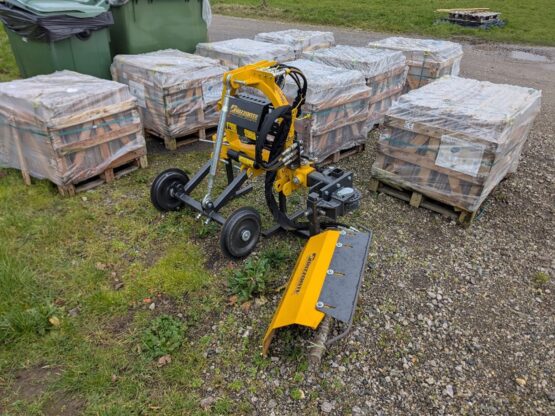Farming in Protected Landscapes Case Study:
Shotley Vineyards Weed Management

For Year 4 of the Farming in Protected Landscapes programme, £2,662 was awarded to Goldcrest Agriculture and Property at Shotley Vineyards to help introduce a new floor management system to manage the ground and weeds beneath the rows of vines.
The new mechanical weeder works by attaching a cylinder of multiple pieces of trimmer line to the back of the tractor. These spin around, much like a conventional strimmer, to remove unwanted weeds from around the vines and reduce them to ground level.
Farmers Charlotte Davitt-Mills and her husband Charlotte manage 16 acres of planted English vines at Shotley Vineyard, launching their first vintage wines in June 2020. The vineyards are beautifully situated overlooking both the Orwell and Stour estuaries.
In their application, the farmer explained that, as with other crops, within a vineyard weeds have to be controlled to reduce negative impacts such as competition for resources – water and soil nutrients. Weeds also create humidity which increases the likelihood of disease in the crops.
The current floor management of these weeds follows a conventional farming approach with use of herbicide, typically glyphosate twice a year plus strimming around the vines. In addition to herbicide use, the farm also applied insecticides prophylactically throughout the growing season to control infestations of damaging invertebrates such as Light brown apple moth and Spotted Wing Drosophila.
How will this equipment benefit the environment?
It will reduce the need for use of herbicide, which can be harmful to insects and wildlife as well as wildflowers. Also there will be reduced need for strimming using a petrol strimmer.
What else will be done?
The farmer will also establish a cover crop mixture in the alley ways, between the vines. The mixture of seeds includes a range of environmentally beneficial species; phacelia and mustard for attracting insects and for organic matter, crimson clovers and vetch for nitrogen fixing and cocksfoot for deep rooting soil structure improvements.
The cover crop will provide pollen & nectar for invertebrates and beneficial insects, cover for animals and to break up the monoculture of the vineyard and increase soil organic matter for the benefit of the vines and overall soil health. The plants used are low-growing therefore will not compete with the vines.
Find out more about Shotley Vineyard at https://shotleyvineyard.co.uk.
